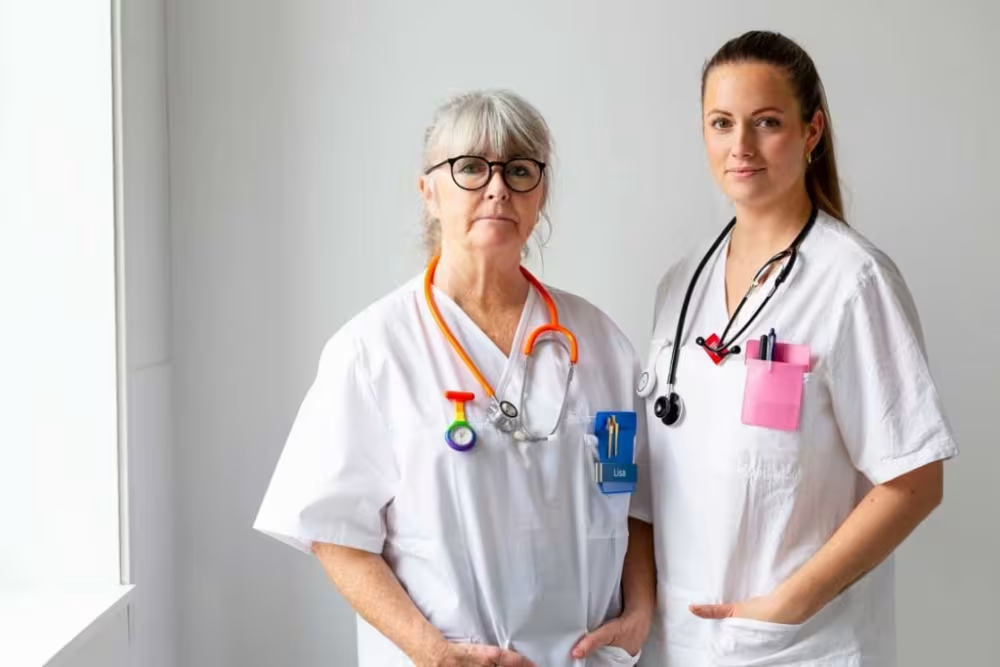Nurse Q&A with Multi-Generational Family of Xavier University Alums
Each blog post is dated and contains accurate information as of that date. Certain information may have changed since the blog post publication date. If you would like to confirm the current accuracy of blog information, please visit our ABSN program overview page or contact us at 866-890-9467.
Read about Susan and Eliana Michaelson, a mother and daughter who experienced our ABSN program. Susan and Eliana enjoyed the flexibility of Xavier’s program and appreciated the hands-on experience of the clinical rotations. They encourage students to persevere and share knowledge at every opportunity.

Are you considering a career in nursing? You may be the right fit for our program if you have a non-nursing bachelor’s degree from a regionally accredited college or university. With Xavier University’s Accelerated Bachelor of Science in Nursing (ABSN) program, you can earn your nursing degree in as few as 16 months.
In a program that short, the curriculum moves quickly, and students may need extra support to succeed. That’s why Xavier offers academic success coaches, the insights of our experienced faculty, and the guidance of our Jesuit values to ensure every student receives the support needed to excel throughout their education and beyond.
Don’t just take our word for it. To get the perspective of an alum and an active student, we spoke to Susan and Eliana Michaelson, a mother-and-daughter duo who chose to earn their BSN degrees from Xavier University’s ABSN program. Let’s find out what they had to say about their experiences.
Why did you choose Xavier? How did you stumble upon the program, and what made it stand out to you?
Susan: Xavier has a good reputation and, simultaneously, the fewest prerequisites to take. I graduated with my initial degree in 1996, so I already had to retake classes because I had been out of school for so long. So, I didn’t want to have to take many other things on top of that.
Then, when Eliana decided to pursue a nursing degree, it was the same thing. We already knew about Xavier, but (we looked at) what other options may or may not be better for her. When it came down to it, they didn’t require as many prerequisites as some other schools.
What were your first degrees?
Susan: Mine is a theology-based research degree.
Eliana: Public relations and marketing, all put together into strategic communication. I also had a co-major in Global Intercultural Studies and a minor in Women’s Gender Studies.

Given that you both had previous non-nursing degrees, why nursing? When and why did you want to make that transition?
Susan: I had always wanted to be a nurse but had a vein phobia. I still have a vein phobia…it kept me from pursuing things earlier than I wanted to. However, I worked in healthcare for a long time as an active-duty officer in the Air Force. I did legal medical review for the Air Force, I also worked in legal medical review for the Social Security Administration, and then I was a nursing home administrator for many years…I worked alongside nurses, and I had nurses who worked for me. It was just a matter of gaining the confidence to overcome what I felt would hold me back.
Eliana: I started pre-med at Miami University of Ohio and wanted to go into nursing, but I barely missed the cut-off. So, it was either doing five years (of school) or doing this major. And what I did was something I was naturally very good at.
After graduation, I immediately started working for a behavioral health company, which is my passion. Still, it was the same thing; I knew I wanted to go into nursing. I started college and didn’t have the confidence…Even if I have the empathy and skills (to be a nurse), I wasn’t personally in touch with myself enough to say, yes, I’m going to go for this. Then, after my time at Miami and my first real job, I decided to bite the bullet and go for it, and it worked out well.
How do you feel your previous degree helped you in nursing school?
Susan: For me, it’s not so much my degree or my previous degrees. My previous work experience greatly impacted school because I worked in healthcare. I reviewed medical records, worked with nurses, reviewed charts, and was involved in the clinical aspect of things for a long time. So, that helped me in nursing school.
Eliana: I’m a little different. Being fresh out of school, I still have all the same skills that I used for studying when I was in school because I didn’t take a huge break in between. However, my college experience helped me discover who I am, which helped me gain confidence. Especially going for a second degree and feeling a little held back at times, those skills I gained in college are helping me now.

No matter where you are in life, it’s never too late to become a nurse. Discover how to make a career change to nursing in only 5 steps.
Do you think there are any specific ideals you saw in yourselves that you believe nurses should have?
Susan: Having empathy and being able to truly care, wanting to help other people, and putting your own needs aside. That goes with working with others, too. You’re not always going to love the people you work with, whether it be other nurses, physicians, aides, or whoever it is; you’re not always going to like (them), but you should be able to put that aside to take care of the patient.
Eliana, you were inspired by your mom’s experience at Xavier to pursue your program. Would you say that seeing your mom in the program gave you a kind of a leg up when starting your own nursing school experience?
Eliana: Probably once a day when we have in-person classes, there’s something that I will say to my class that I know from my mom’s experience. For instance, they talked about our next semester, and I told them it would be the most challenging based on what my mom told me. And our instructor agreed.

My mom is also helpful because I can go to her if I don’t understand a concept. Especially with an ABSN program where it’s so quick and you never know what will happen next, it’s nice to have somebody who’s gone through the program who can give me that reassurance, which I then share with my class.
What advice would you give other students entering the Xavier ABSN program? What do you think is the best thing for them to know?
Susan: To work hard. I worked full-time as a nursing home administrator and still did well in the class. Just deciding that you will do it and putting in 100% effort. Do it and know that you can make it through and that there will be days when you feel like you can’t do it anymore…One bad grade, one bad interaction, or one screw-up on the floor does not make a failure. It’s just a bad day; you can move on and learn from it.
Every Wednesday, I ask, “What did you learn this week that you think could help all of us?” It’s so important to share those things. Make sure you’re sharing what you learn because somebody else might already know that, but they might not. It’s those little things you learn. That’s what I tell people: share your knowledge and seek out wisdom from other people.
How did the school prepare you for your career? What things throughout your education do you feel set you up or are setting you up?
Susan: Xavier ABSN did a great job with our clinicals. I had good clinical instructors, and I had excellent clinical experiences at the hospitals where we were. Speaking to people now from other schools, they didn’t necessarily have this. They might have had some in-classroom experience that we didn’t have.
Since part of the Xavier curriculum is online, it differs from a learning standpoint. From an academic perspective, though, clinical experiences are where you learn the most from those hands-on experiences.
Walk through your experience with online learning -- how was it helpful to your nursing education?
Eliana: The people in my cohort who are my age and were in college when I was – we’re at such an advantage since we’re already so used to online learning due to COVID. But it’s much harder for some people in my cohort, who are 26-28. It’s a lot harder to gain those skills to teach yourself via online instruction. However, I’m used to doing this every day.
My mom and I also have different study techniques. When I was at her house, she was on her computer 24/7, teaching herself things, and I’m not like that because I can retain (the information) so much differently. I owe a lot to the fact that I was already forced to do online learning. With many people coming into a nursing school like here soon, if they do the program, they’ll all have that as well.
Susan: She saw me online more because I worked full-time, so I had to be on my computer when I was off…But my cohort was twice the size of hers, and about a third of them were closer to my age. It was all in person when we had all gone to school. Online classes were a new thing, and people rarely took them. So, there was a little bit of a learning curve.
Personally, for me and my schedule, it worked much better. I liked having the flexibility of watching every lecture at 9 p.m. instead of being forced to sit in a class…but, as Eliana said, so much of that is based on your learning style, and it’s not for everybody.
With the right strategies, you can ace your way through your BSN. Get started with 8 tips for how to study in nursing school.

The culminating piece of nursing school is preparing to pass the NCLEX and land a job as a licensed registered nurse. How does it feel to graduate from the program knowing everything you put into it? How do you think the program prepared you to take and pass the NCLEX?
Susan: It was amazing to graduate because it just flew by. It is only 16 months, so it’s over quicker than you think it will be. There were days when it felt like I couldn’t do it anymore. I made it, though, so that was amazing.
The school did an excellent job of preparing me. My cohort had a 100% first-time pass rate. The NCLEX is a hard test. So, for me to go into a test and take it and go, wow, that wasn’t that bad, it means that I was prepared. Our school tests were all based on NCLEX-style questions, which was also helpful. We did a lot of ATI prep, so the program did an excellent job.

Feeling unprepared for the NCLEX exam? Find out how to prepare for the NCLEX in 9 steps.
Now that you’ve heard it first-hand, contact a Xavier University admissions advisor to start your nursing journey.
